| Listing 1 - 10 of 10 |
Sort by
|
Book
ISBN: 3110048019 311162109X Year: 1974 Publisher: De Gruyter
Abstract | Keywords | Export | Availability | Bookmark
 Loading...
Loading...Choose an application
- Reference Manager
- EndNote
- RefWorks (Direct export to RefWorks)
To celebrate the 270th anniversary of the De Gruyter publishing house, the company is providing permanent open access to 270 selected treasures from the De Gruyter Book Archive. Titles will be made available to anyone, anywhere at any time that might be interested. The DGBA project seeks to digitize the entire backlist of titles published since 1749 to ensure that future generations have digital access to the high-quality primary sources that De Gruyter has published over the centuries.
Programming --- 681.3*D32 --- language classifications: applicative languages; data-flow languages; design languages; extensible languages; macro and assembly languages; nonprocedural languages; specialized application and very high-level languages (Programminglanguages) --- 681.3*D32 language classifications: applicative languages; data-flow languages; design languages; extensible languages; macro and assembly languages; nonprocedural languages; specialized application and very high-level languages (Programminglanguages) --- COMPUTERS / General.
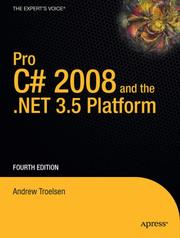
ISBN: 1281220248 9786611220242 1430204222 1590598849 9781590598849 Year: 2007 Publisher: Berkeley, CA New York Apress Distributed to the Book trade worldwide by Springer-Verlag New York
Abstract | Keywords | Export | Availability | Bookmark
 Loading...
Loading...Choose an application
- Reference Manager
- EndNote
- RefWorks (Direct export to RefWorks)
A definitive overview of the new .NET 3.5 technology examines the integration of C# 3.0 with .NET 3.5, as well as the technology's integration with previous versions of .NET and ancillary technologies, discussing such new features as LINQ and ASP.NET AJAX, as well as C# programming fundamentals, Advanced Object Oriented Constructs, .NET Assemblies, user interfaces, Web applications, and .NET interoperability. Original. (Intermediate/Advanced) Front Cover.
C# (Computer program language) --- Internet programming. --- Microsoft .NET. --- Computer programming --- Dot Net (Software framework) --- Microsoft .NET --- Microsoft .NET software framework --- .NET Framework --- Information Technology --- Computer Science (Hardware & Networks) --- General and Others --- Software engineering. --- Software Engineering/Programming and Operating Systems. --- Computer software engineering --- Engineering --- Internet programming --- 681.3*D32 --- 681.3*D32 language classifications: applicative languages; data-flow languages; design languages; extensible languages; macro and assembly languages; nonprocedural languages; specialized application and very high-level languages (Programminglanguages) --- language classifications: applicative languages; data-flow languages; design languages; extensible languages; macro and assembly languages; nonprocedural languages; specialized application and very high-level languages (Programminglanguages) --- Microsoft .NET Framework.
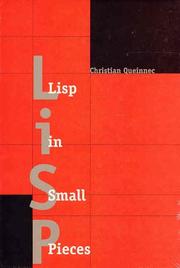
ISBN: 1139636200 1316087395 1139648799 1139638343 1139641182 1139172972 9781139648790 9781139172974 0521562473 9780521562478 9780521545662 0521545668 Year: 1996 Publisher: Cambridge : Cambridge University Press,
Abstract | Keywords | Export | Availability | Bookmark
 Loading...
Loading...Choose an application
- Reference Manager
- EndNote
- RefWorks (Direct export to RefWorks)
This is a comprehensive account of the semantics and the implementation of the whole Lisp family of languages, namely Lisp, Scheme and related dialects. It describes 11 interpreters and 2 compilers, including very recent techniques of interpretation and compilation. The book is in two parts. The first starts from a simple evaluation function and enriches it with multiple name spaces, continuations and side-effects with commented variants, while at the same time the language used to define these features is reduced to a simple lambda-calculus. Denotational semantics is then naturally introduced. The second part focuses more on implementation techniques and discusses precompilation for fast interpretation: threaded code or bytecode; compilation towards C. Some extensions are also described such as dynamic evaluation, reflection, macros and objects. This will become the new standard reference for people wanting to know more about the Lisp family of languages: how they work, how they are implemented, what their variants are and why such variants exist. The full code is supplied (and also available over the Net). A large bibliography is given as well as a considerable number of exercises. Thus it may also be used by students to accompany second courses on Lisp or Scheme.
LISP (Computer program language) --- List processing computer language --- List processing (Electronic computers) --- 681.3*D11 --- 681.3*D32 --- 681.3*D11 Applicative (functional) programming --- Applicative (functional) programming --- 681.3*D32 language classifications: applicative languages; data-flow languages; design languages; extensible languages; macro and assembly languages; nonprocedural languages; specialized application and very high-level languages (Programminglanguages) --- language classifications: applicative languages; data-flow languages; design languages; extensible languages; macro and assembly languages; nonprocedural languages; specialized application and very high-level languages (Programminglanguages) --- LISP (Computer program language). --- Computer programming.
Book
ISBN: 9780120887859 0120887851 9780080568850 0080568858 1282285122 9781282285125 9786612285127 6612285125 Year: 2008 Publisher: Amsterdam : Morgan Kaufmann Publishers,
Abstract | Keywords | Export | Availability | Bookmark
 Loading...
Loading...Choose an application
- Reference Manager
- EndNote
- RefWorks (Direct export to RefWorks)
VHDL, the IEEE standard hardware description language for describing digital electronic systems, has recently been revised. This book has become a standard in the industry for learning the features of VHDL and using it to verify hardware designs. This third edition is the first comprehensive book on the market to address the new features of VHDL-2008.* First comprehensive book on VHDL to incorporate all new features of VHDL-2008, the latest release of the VHDL standard...helps readers get up to speed quickly with new features of the new standard.* Presents a structured guide to t
Programming --- VHDL (Computer hardware description language) --- Electronic digital computers --- Computer simulation. --- Computer simulation --- VHDL (Langage de description de matériel informatique) --- Simulation par ordinateur --- 681.3.066 --- 681.3*D32 --- 681.3*D32 language classifications: applicative languages; data-flow languages; design languages; extensible languages; macro and assembly languages; nonprocedural languages; specialized application and very high-level languages (Programminglanguages) --- language classifications: applicative languages; data-flow languages; design languages; extensible languages; macro and assembly languages; nonprocedural languages; specialized application and very high-level languages (Programminglanguages) --- Very High Speed Integrated Circuits Hardware Description Language (Computer hardware description language) --- VHSIC Hardware Description Language (Computer hardware description language) --- Computer hardware description languages --- Integrated circuits --- Automatic digital computers --- Computers, Electronic digital --- Digital computers, Electronic --- Computers --- Hybrid computers --- Sequential machine theory --- Computerwetenschap--?.066 --- Digitale techniek --- VHDL

ISBN: 9781590595039 1590595033 1430211970 9786610700486 1280700483 1430200456 Year: 2005 Publisher: Berkeley Apress
Abstract | Keywords | Export | Availability | Bookmark
 Loading...
Loading...Choose an application
- Reference Manager
- EndNote
- RefWorks (Direct export to RefWorks)
Pro J2ME Polish: Open Source Wireless Java Tools Suite is written for wireless and other mobile Java programmers who want to "polish" their efficiency and acquire in-depth knowledge about programming real-world J2ME applications. It also uncovers all common device limitations and quirks, and explains how these can be circumvented. The book describes the open-source tools collection J2ME Polish, and shows how the tools can be used for creating professional J2ME applications. Building multiple devices and multiple locales is easy after studying this book. Author Robert Virkus offers tips about the more hidden features of J2ME Polish, like the logging framework, the preprocessor, and the game-engine. You will learn to polish up your applications with the powerful GUI that enables you to design standard J2ME applications with simple CSS text files. You'll also learn to write portable, fast applications while using all available features on your target devices simultaneously.
Java (Computer program language) --- Wireless communication systems --- Java (Langage de programmation) --- Transmission sans fil --- Java (Computer program language). --- Programming. --- Wireless communication systems - Programming . --- Computer Science --- Engineering & Applied Sciences --- Programming --- 681.3*D33 --- 681.3*D32 --- Communication systems, Wireless --- Wireless data communication systems --- Wireless information networks --- Wireless telecommunication systems --- Telecommunication systems --- Object-oriented programming languages --- JavaSpaces technology --- Languages constructs: abstract data types; concurrent programming structures;control structures; coroutines (Programming languages) --- language classifications: applicative languages; data-flow languages; design languages; extensible languages; macro and assembly languages; nonprocedural languages; specialized application and very high-level languages (Programminglanguages) --- 681.3*D32 language classifications: applicative languages; data-flow languages; design languages; extensible languages; macro and assembly languages; nonprocedural languages; specialized application and very high-level languages (Programminglanguages) --- 681.3*D33 Languages constructs: abstract data types; concurrent programming structures;control structures; coroutines (Programming languages) --- EPUB-LIV-FT LIVINFOR SPRINGER-B --- Computer science. --- Software engineering. --- Computer Science. --- Software Engineering/Programming and Operating Systems. --- Computer software engineering --- Engineering --- Informatics --- Science --- Java.
Book
ISBN: 9781107029576 1107029570 9781139342131 1107306841 9781107306844 9781107314597 1107314593 1139342134 9781107301757 1107301750 9781107309043 1107309042 1107237300 9781107237308 1107254868 9781107254862 Year: 2013 Publisher: Cambridge : Cambridge University Press,
Abstract | Keywords | Export | Availability | Bookmark
 Loading...
Loading...Choose an application
- Reference Manager
- EndNote
- RefWorks (Direct export to RefWorks)
Types are the central organizing principle of the theory of programming languages. In this innovative book, Professor Robert Harper offers a fresh perspective on the fundamentals of these languages through the use of type theory. Whereas most textbooks on the subject emphasize taxonomy, Harper instead emphasizes genetics, examining the building blocks from which all programming languages are constructed. Language features are manifestations of type structure. The syntax of a language is governed by the constructs that define its types, and its semantics is determined by the interactions among those constructs. The soundness of a language design - the absence of ill-defined programs - follows naturally. Professor Harper's presentation is simultaneously rigorous and intuitive, relying on elementary mathematics. The framework he outlines scales easily to a rich variety of language concepts and is directly applicable to their implementation. The result is a lucid introduction to programming theory that is both accessible and practical.
Programming languages (Electronic computers). --- Computers --- Programming Languages --- General. --- Programming languages (Electronic computers) --- COMPUTERS / Programming Languages / General --- 681.3*D33 --- 681.3*D3 --- 681.3*F33 --- 681.3*F3 --- 681.3*F3 Logics and meanings of programs (Theory of computation) --- Logics and meanings of programs (Theory of computation) --- 681.3*D3 Programming languages --- Programming languages --- 681.3*D33 Languages constructs: abstract data types; concurrent programming structures;control structures; coroutines (Programming languages) --- Languages constructs: abstract data types; concurrent programming structures;control structures; coroutines (Programming languages) --- Computer languages --- Computer program languages --- Computer programming languages --- Machine language --- Electronic data processing --- Languages, Artificial --- 681.3*F33 Studies of program constructs: control primitives; functional constructs; program and recursion schemes; type structure (Logics and meanings of programs)-- See also {681.3*D32}; {681.3*D33} --- Studies of program constructs: control primitives; functional constructs; program and recursion schemes; type structure (Logics and meanings of programs)-- See also {681.3*D32}; {681.3*D33}
Book
ISBN: 1281731749 9786611731748 184719415X 9781847194152 9781847194145 1847194141 9781281731746 6611731741 Year: 2008 Publisher: Birmingham, UK : Packt Publishing,
Abstract | Keywords | Export | Availability | Bookmark
 Loading...
Loading...Choose an application
- Reference Manager
- EndNote
- RefWorks (Direct export to RefWorks)
Create scalable, reusable high-quality JavaScript applications and libraries
Computer software --- JavaScript (Computer program language) --- Object-oriented programming (Computer science) --- Software patterns. --- Patterns, Software --- Computer programming --- Object-oriented methods (Computer science) --- Document Object Model (Web site development technology) --- Domain-specific programming languages --- Object-oriented programming languages --- Scripting languages (Computer science) --- Reusability of software --- Reusable code (Computer programs) --- Software reusability --- Software reengineering --- Generic programming (Computer science) --- Reusability. --- Development --- 681.3*D32 --- 681.3*D23 --- 681.3*D15 --- 681.3*D23 Coding: pretty printers; program editors; reentrant code; standards (Softwareengineering) --- Coding: pretty printers; program editors; reentrant code; standards (Softwareengineering) --- 681.3*D15 Software: object-oriented programming --- Software: object-oriented programming --- 681.3*D32 language classifications: applicative languages; data-flow languages; design languages; extensible languages; macro and assembly languages; nonprocedural languages; specialized application and very high-level languages (Programminglanguages) --- language classifications: applicative languages; data-flow languages; design languages; extensible languages; macro and assembly languages; nonprocedural languages; specialized application and very high-level languages (Programminglanguages)
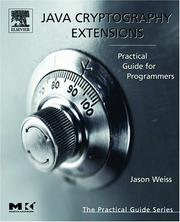
ISBN: 9780127427515 0127427511 9780080535241 0080535240 9786611033774 1281033774 Year: 2004 Publisher: San Francisco, CA : Elsevier/Morgan Kaufmann,
Abstract | Keywords | Export | Availability | Bookmark
 Loading...
Loading...Choose an application
- Reference Manager
- EndNote
- RefWorks (Direct export to RefWorks)
For a long time, there has been a need for a practical, down-to-earth developers book for the Java Cryptography Extension. I am very happy to see there is now a book that can answer many of the technical questions that developers, managers, and researchers have about such a critical topic. I am sure that this book will contribute greatly to the success of securing Java applications and deployments for e-business. --Anthony Nadalin, Java Security Lead Architect, IBMFor many Java developers and software engineers, cryptography is an ""on-demand"" programming exercise, where cryptographi
Writing --- Cryptography --- Java (Computer program language) --- 681.3*D32 --- 681.3*E3 --- 681.3*E --- 681.3*E3 Data encryption: data encryption standard; DES; public key cryptosystems --- Data encryption: data encryption standard; DES; public key cryptosystems --- 681.3*D32 language classifications: applicative languages; data-flow languages; design languages; extensible languages; macro and assembly languages; nonprocedural languages; specialized application and very high-level languages (Programminglanguages) --- language classifications: applicative languages; data-flow languages; design languages; extensible languages; macro and assembly languages; nonprocedural languages; specialized application and very high-level languages (Programminglanguages) --- Object-oriented programming languages --- JavaSpaces technology --- 681.3*E Data --- Data --- Cryptanalysis --- Cryptology --- Secret writing --- Steganography --- Signs and symbols --- Symbolism --- Ciphers --- Data encryption (Computer science) --- Cryptography.
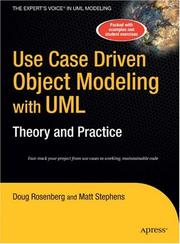
ISBN: 1430243066 1281491055 9786611491055 1430203692 1590597745 9781590597743 9781430243052 1430243058 Year: 2007 Publisher: Berkeley Apress
Abstract | Keywords | Export | Availability | Bookmark
 Loading...
Loading...Choose an application
- Reference Manager
- EndNote
- RefWorks (Direct export to RefWorks)
Use Case Driven Object Modeling with UML: Theory and Practice shows how to drive an object-oriented software design from use case all the way through coding and testing, based on the minimalist, UML-based ICONIX process. In addition to a comprehensive explanation of the foundations of the approach, the book makes extensive use of examples and provides exercises at the back of each chapter. This book leads by example. It demonstrates common analysis and design errors, shows how to detect and fix them, and suggests how to avoid making the same errors in the future. The book also encourages you to examine its UML examples and to search for specific errors. You'll get clues, then later receive the answers during review sessions toward the end of the book.
UML (Computer science) --- Unified Modeling Language (Computer science) --- Computer software --- Modeling languages (Computer science) --- Object-oriented methods (Computer science) --- Development --- Information Technology --- Software Engineering --- Approche orientee objet (Informatique) --- Cas d'utilisation (Ingenierie des systemes) --- UML (Informatique) --- 681.3*D23 --- 681.3*D2 --- 681.3*D23 Coding: pretty printers; program editors; reentrant code; standards (Softwareengineering) --- Coding: pretty printers; program editors; reentrant code; standards (Softwareengineering) --- 681.3*D2 Software engineering: protection mechanisms; standards--See also {681.3*K63}; {681.3*K51} --- Software engineering: protection mechanisms; standards--See also {681.3*K63}; {681.3*K51} --- Computer science. --- Software engineering. --- Programming Languages, Compilers, Interpreters. --- Software Engineering/Programming and Operating Systems. --- Informatics --- Science --- Computer software engineering --- Engineering --- Programming languages (Electronic computers). --- Computer languages --- Computer program languages --- Computer programming languages --- Machine language --- Electronic data processing --- Languages, Artificial --- 681.3*D32 --- 681.3*D32 language classifications: applicative languages; data-flow languages; design languages; extensible languages; macro and assembly languages; nonprocedural languages; specialized application and very high-level languages (Programminglanguages) --- language classifications: applicative languages; data-flow languages; design languages; extensible languages; macro and assembly languages; nonprocedural languages; specialized application and very high-level languages (Programminglanguages) --- Compilers (Computer programs). --- Compilers and Interpreters. --- Software Engineering. --- Compiling programs (Computer programs) --- Computer programs --- Programming software --- Systems software
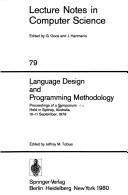
ISBN: 0387097430 0387097449 9786611953836 1281953830 0387097457 3540097457 3540385797 3540097430 3540385754 9783540097433 9783540097457 9780387097459 9780387097442 Year: 2009 Volume: 176 Publisher: New York, NY : Springer New York : Imprint: Springer,
Abstract | Keywords | Export | Availability | Bookmark
 Loading...
Loading...Choose an application
- Reference Manager
- EndNote
- RefWorks (Direct export to RefWorks)
Antisocial acts by children and teens are on the rise – from verbal abuse to physical bullying to cyber-threats to weapons in schools. Strictly punitive responses to aggressive behavior may even escalate a situation, leaving peers, parents, and teachers feeling helpless. This unique volume conceptualizes aggression as a symptom of underlying behavioral and emotional problems and examines the psychology of perpetrators and the power dynamics that foster intentionally hurtful behavior in young people. It details for readers how bibliotherapy offers relevant, innovative, and flexible treatment – as a standalone intervention or as a preventive method in conjunction with other forms of treatment – and can be implemented with individuals and groups, parents, teachers, and even rivals. Treating Child and Adolescent Aggression Through Bibliotherapy: Offers research-based guidelines for treating aggression in children and adolescents. Provides an integrative approach to treating aggressive children and youth to more fully address the complex nature of antisocial behavior. Sets out a practical framework for bibliotherapy, choosing developmentally appropriate materials, identifying themes for discussion, matching selections to therapeutic progress, and more. Demonstrates individual and group bibliotherapy sessions with male and female children and adolescents. Includes a complete session-by-session prevention program for the classroom. Features an appendix of suggestions for effective therapeutic literature. This unique, must-have resource is essential reading for school psychologists, school counselors, social workers, and clinical child psychologists and any allied educational and mental health professionals who work with troubled youth.
Aggression -- Psychology. --- Aggressiveness in adolescence -- Treatment. --- Aggressiveness in children -- Treatment. --- Bibliotherapy for children. --- Bibliotherapy for teenagers. --- Aggressiveness in children --- Aggressiveness in adolescence --- Bibliotherapy for children --- Bibliotherapy for teenagers --- Psychology --- Bibliotherapy --- Aggression --- Adolescent --- Child --- Methods --- Behavioral Sciences --- Social Behavior --- Age Groups --- Investigative Techniques --- Behavioral Symptoms --- Rehabilitation --- Psychotherapy --- Behavioral Disciplines and Activities --- Behavior --- Analytical, Diagnostic and Therapeutic Techniques and Equipment --- Therapeutics --- Persons --- Behavior and Behavior Mechanisms --- Named Groups --- Psychiatry and Psychology --- Pediatrics --- Medicine --- Health & Biological Sciences --- Treatment --- Treatment. --- Aggressiveness (Psychology) in adolescence --- Aggressiveness (Child psychology) --- Aggressiveness (Psychology) in children --- Tools and techniques: decision tables flow charts modules and interfaces programmer workbench software libraries structured programming top-down programming user interfaces (Software engineering) --- language classifications: applicative languages data-flow languages design languages extensible languages macro and assembly languages nonprocedural languages specialized application and very high-level languages (Programminglanguages) --- Languages constructs: abstract data types concurrent programming structurescontrol structures coroutines (Programming languages) --- Process management: concurrency deadlocks multiprocessing/multiprogrammingmutual exclusion scheduling synchronization (Operating systems) --- 681.3*D33 Languages constructs: abstract data types concurrent programming structurescontrol structures coroutines (Programming languages) --- 681.3*D32 language classifications: applicative languages data-flow languages design languages extensible languages macro and assembly languages nonprocedural languages specialized application and very high-level languages (Programminglanguages) --- 681.3*D22 Tools and techniques: decision tables flow charts modules and interfaces programmer workbench software libraries structured programming top-down programming user interfaces (Software engineering) --- 681.3*D41 Process management: concurrency deadlocks multiprocessing/multiprogrammingmutual exclusion scheduling synchronization (Operating systems) --- Diminishing returns --- Multiplication, Complex. --- Psychology. --- Education. --- Social work. --- Clinical psychology. --- Psychotherapy. --- Counseling. --- Child psychology. --- School psychology. --- Personality. --- Social psychology. --- Clinical Psychology. --- Child and School Psychology. --- Education, general. --- Psychotherapy and Counseling. --- Social Work. --- Personality and Social Psychology. --- Programming --- 681.3*A0 --- 681.3*D22 --- 681.3*D32 --- 681.3*D33 --- 681.3*D41 --- 681.3*D33 Languages constructs: abstract data types; concurrent programming structures;control structures; coroutines (Programming languages) --- Languages constructs: abstract data types; concurrent programming structures;control structures; coroutines (Programming languages) --- 681.3*D32 language classifications: applicative languages; data-flow languages; design languages; extensible languages; macro and assembly languages; nonprocedural languages; specialized application and very high-level languages (Programminglanguages) --- language classifications: applicative languages; data-flow languages; design languages; extensible languages; macro and assembly languages; nonprocedural languages; specialized application and very high-level languages (Programminglanguages) --- 681.3*D22 Tools and techniques: decision tables; flow charts; modules and interfaces; programmer workbench; software libraries; structured programming; top-down programming; user interfaces (Software engineering) --- Tools and techniques: decision tables; flow charts; modules and interfaces; programmer workbench; software libraries; structured programming; top-down programming; user interfaces (Software engineering) --- 681.3*A0 General --- General --- 681.3*D41 Process management: concurrency; deadlocks; multiprocessing/multiprogramming;mutual exclusion; scheduling; synchronization (Operating systems) --- Process management: concurrency; deadlocks; multiprocessing/multiprogramming;mutual exclusion; scheduling; synchronization (Operating systems) --- Adolescent psychotherapy --- Child psychotherapy --- Adolescent psychology --- Child psychology --- Conduct disorders in children --- Curves, Elliptic. --- Programming languages (Electronic computers) --- Computer programming --- Langages de programmation --- Programmation (Informatique) --- Congresses --- Congrès --- Psychology, clinical. --- Developmental psychology. --- Applied psychology. --- Consciousness. --- Apperception --- Mind and body --- Perception --- Philosophy --- Spirit --- Self --- Benevolent institutions --- Philanthropy --- Relief stations (for the poor) --- Social service agencies --- Social welfare --- Social work --- Human services --- Applied psychology --- Psychagogy --- Psychology, Practical --- Social psychotechnics --- Development (Psychology) --- Developmental psychobiology --- Life cycle, Human --- Software engineering. --- Software Engineering. --- Computer software engineering --- Engineering --- Children --- Education, Primitive --- Education of children --- Human resource development --- Instruction --- Pedagogy --- Schooling --- Students --- Youth --- Civilization --- Learning and scholarship --- Mental discipline --- Schools --- Teaching --- Training --- Psychology, School --- Psychology, Applied --- Behavior, Child --- Child behavior --- Child study --- Pediatric psychology --- Child development --- Developmental psychology --- Psychiatry --- Psychological tests --- Mass psychology --- Psychology, Social --- Human ecology --- Social groups --- Sociology --- Personal identity --- Personality psychology --- Personality theory --- Personality traits --- Personology --- Traits, Personality --- Individuality --- Temperament --- Counselling --- Helping behavior --- Clinical sociology --- Interviewing --- Personal coaching --- Social case work --- Therapy (Psychotherapy) --- Mental illness --- Mental health counseling --- Education --- Logique --- Courbes elliptiques --- Nombres, Théorie des --- Langages de programmation.
| Listing 1 - 10 of 10 |
Sort by
|

 Search
Search Feedback
Feedback About
About Help
Help News
News